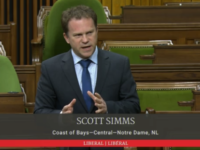From Bitcoin to NFTs, interest in crypto and the blockchain has never been greater. Millions of people around the world invest in various crypto currencies, exchanges seem to pop-up daily, and for better or worse the pace of innovation and new services is reminiscent of the early of the days of the Internet. As the industry races ahead, where does the law fit in? Can the law fit in?
Addison Cameron-Huff is a Toronto-based blockchain and cryptocurrency lawyer. A former president of Decentral, a leading Canadian blockchain company and the co-founder of Toronto Blockchain Week, his clients have included virtual currency dealers, DeFI platforms, and stablecoin developers. He joins the Law Bytes podcast to provide some insight into the state of Canadian law and regulation when it comes to this fast-moving, globally oriented sector.
Read more ›
Scott Simms, a Liberal MP from Newfoundland for 17 years, was long recognized as a leading voice on Parliament Hill on cultural and digital policy. Simms recently served as the chair of the Standing Committee on Canadian Heritage, which conducted the review of Bill C-10 and which placed him at the heart of one of the year’s more controversial pieces of proposed legislation. Simms was not re-elected this past fall and is now well positioned to reflect on policy making in Canada and the issues that arose with Bill C-10. He joins the Law Bytes podcast for a conversation about the bill, his suggestions for how the process can be improved, and his thoughts on the challenges of crafting forward-looking digital policies.
Read more ›
NDP MP Charlie Angus has been a consistent – and persistent – voice on digital policies since his election to the House of Commons in 2004. He was one of the first MPs to seriously consider user rights within Canadian copyright law, a vocal supporter of net neutrality and more affordable wireless services, and a leading advocate for privacy protection and social media regulation.
Last week, Angus called a press conference to unveil his six point plan for digital policy, which emphasized accountability, privacy reform, and algorithmic transparency. Along the way, he derided the government’s Bill C-10 efforts as a political dumpster fire and voiced support for the creation of a new officer of parliament charged with responsibility for social media regulation. Charlie Angus joins the Law Bytes podcast this week to reflect on the failed bill C-10 and C-11, his concerns with the online harms consultation, and his hopes for the coming parliamentary session.
Read more ›
Facebook has once again found itself in the political spotlight as Frances Haugen, a former data scientist and product manager with the company turned whistleblower, provided the source documents for an explosive investigative series in the Wall Street Journal followed by an appearance before a U.S. Senate committee. The Facebook Files series comes just as Canada is moving toward its own legislative response to Internet concerns, with an online harms consultation that provides a roadmap for future policies.
The Canadian initiative has sparked widespread criticism, but recent events may only increase the calls for legislative action. Taylor Owen, the Beaverbrook Chair in Media, Ethics and Communications in the Max Bell School of Public Policy at McGill University joins the Law Bytes podcast to discuss the latest revelations and what they might mean for the future of Canadian Internet regulation.
Read more ›
Privacy reform in Canada has lagged at the federal level with the efforts to update PIPEDA seemingly going nowhere, but multiple provinces have moved ahead with amending their own laws. Quebec leads the way as late last month it quietly passed Bill 64, a major privacy reform package that reflects – and even goes beyond – many emerging international privacy law standards. Chantal Bernier, the former interim privacy commissioner of Canada, now leads the Dentons law firm’s Canadian Privacy and Cybersecurity practice group. She joins the Law Bytes podcast to talk about Bill 64, including its origins, key provisions, and implications for privacy law in Canada.
Read more ›











